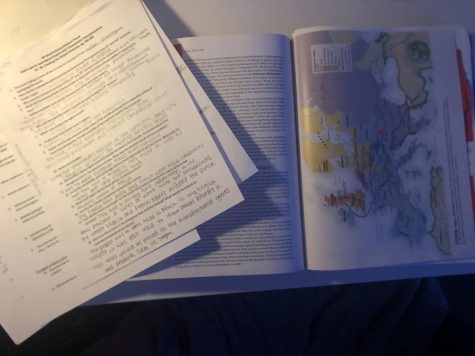The Buzz Behind AP Courses: Are they useful?
February 8, 2022

As a high school student, I constantly feel pressured to have a higher GPA to succeed in an excellent college. With few ways to achieve higher than a 4.0 GPA, I can find myself in a difficult position. Taking AP and honor classes are known to add seven extra points to one’s overall grade, but how effective are these options?
When choosing classes for a brand-new school year, students are told that taking an AP course will give them college credits. They get excited about this opportunity, but most are not prepared to walk into this advanced environment. While this is true, the only way to earn these credits is by passing the AP exam at the end of the school year; this is a highly complicated exam. Even if a student were to complete the class with an outstanding grade, not passing the exam means the course would have been taken for nothing, leaving them without the college credit they were seeking. While doing well in the overall class can still up your GPA, it makes no sense to have taken the course after failing the exam.
If a student is taking an AP class, their main reasoning is to receive college credits; that’s why they exist in the first place. When the end of the year exam rolls around, most students have gone through the struggles of the class not to achieve their goal. Research shows that AP scores have a minimal impact on college admissions, so what is the point?
AP World History teacher Mrs. Pierce says, “AP classes can serve multiple benefits in the long run. First, it is awesome if you can get the college credit. But besides the college credit, AP classes teach many students the value of discipline and hard work. Most importantly, AP classes help students learn about their own resiliency and capabilities, and that failure can be an opportunity to grow.” Although an AP course can provide benefits for one’s future, mainly it negatively impacts a student’s school schedule, and some students can’t handle failure as well as others can.
As AP stands for “advanced placement,” courses are at the college level, leaving students flooded with an overload of work and challenging exams, cramming multiple units into one. The amount of studying needed to be put in every night can be mentally draining and affect how a student performs even with the extra hours put in. It can be tough to balance this workload with five other classes, especially for students taking honors-level courses. Sophomore Tony Katchourine is battling an AP class in his everyday schedule. He says, “I would say that the workload of AP classes is a considerable amount bigger, but it sometimes gets in the way of my other classes and personal activities.” His multiple commitments outside of school make it even harder to balance schoolwork within the week, resulting in academic stress and limited time for rest.
Honors classes are another way to succeed past a 4.0 GPA and are preferred by more students. Staying at a high school level, honors classes provide an extra seven points to a passing student’s grade. The only big noticeable difference between an on-level and honors class is a heavier workflow in an honors class, which makes sense to earn those extra points. There is no way to earn college credit, but a considerable weight is lifted off your shoulders without the powerful workflow. The honors teachers also grade much harder, as they expect you to perform more advanced. Without the stress of an exam that makes it or breaks it, you must stay on top of the work, which isn’t as complicated as stressful as an AP course.
In the long run, AP courses can help students improve their time management and prepare them for college, but there needs to be another more manageable way to earn college credit. The additional stress added to a teenager’s life seems unnecessary as they already live a busy life.
Check out Morandi Lawrence’s article as she points out mental health and academic stress in Roswell students.

